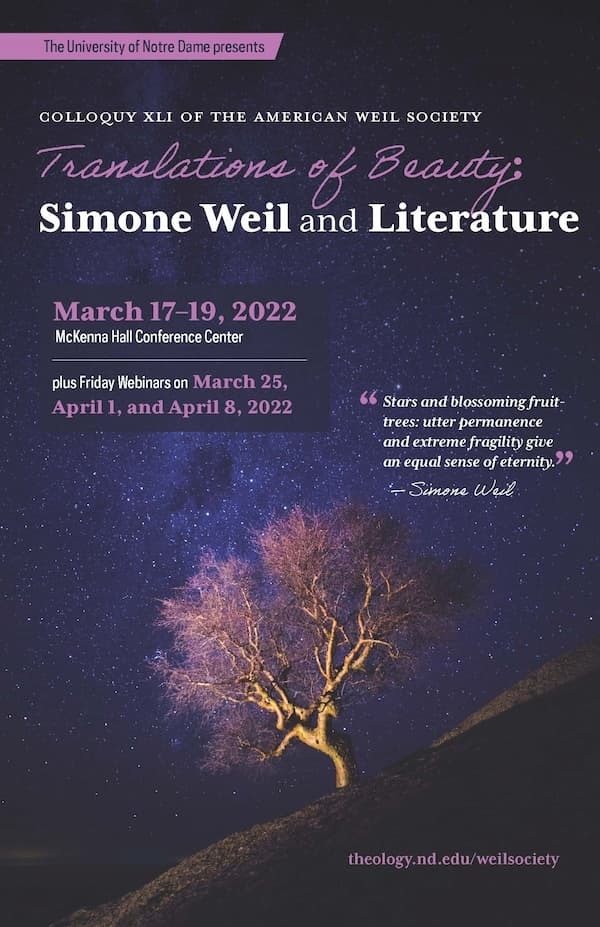
Reading Simone Weil in Translation: a panel of three noted translators—see below— will discuss the pleasures and pitfalls of translating Simone Weil’s works, moderated by internationally recognized translator Tess Lewis. April 1, 2022, from 11:30 – 1:00 EST -
If you wish to attend the roundtable “The Pleasures and Pitfalls of Translating Simone Weil”, please visit the following AWS web page and you will see the link to log onto Zoom (just look for “To attend the Friday Web Series Webinars, click here”):
http://www.americanweilsociety.org/information_for_2022_colloquy/friday_web_series
To attend the webinar at the proper time, please click here: no registration required
Moderator Tess Lewis is a writer and translator from French and German and Co-Chair of the PEN America Translation Committee. Her Awards include: PEN Translation Prize, Guggenheim Fellowship for Humanities, US & Canada http://www.tesslewis.org/about
"Language is a porous border, but a border nonetheless, and one that must be crossed and re-crossed continuously."
Ros Schwartz is an award-winning translator from French, a recipient of the Chevalier de l’Ordre des Arts et des Lettres from the French government and of the John Sykes Memorial Prize for excellence by the Institute of Translation and Interpreting. Ms. Schwartz is presenting translating Simone Weil’s Enracinement for Penguin UK. https://www.rosschwartz.co.uk/home
Ms Schwartz subscribes to the art of translation as described by the Portuguese Nobel laureate José Saramago: "Writers make national literature, while translators make universal literature.”
Philip Wilson and Silvia Caprioglio Panizza are translators of Simone Weil’s “Vénise sauvée” and Weil’s poems, both translations for Bloomsbury Press. Philip, presently Lecturer in Philosophy, School of Politics, Philosophy, Language and Communication Studies at the University of East Anglia, is a co-translator of The Histories of Alexander Neville (1544-1614 from Latin for the Boydell Press and author of Translation After Wittgenstein, Routledge 2016.
https://research-portal.uea.ac.uk/en/persons/philip-wilson
He agrees with Wittgenstein who maintains that he writes “not to spare other people the trouble of thinking” but to stimulate them to thoughts of their own.” In the world of translation after Wittgenstein, that is what matters.
Silvia Panizza is a Marie Skłodowska-Curie Research Fellow, Centre for Ethics, University of Pardubice & Fellow of the Horizon 2020 project PERITIA (Policy, Expertise and Trust in Action) at the Centre for Ethics in Public Life (CEPL), University College Dublin.
https://centreforethics.upce.cz/en/silvia-caprioglio-panizza
Silvia has the following monograph forthcoming:
Caprioglio Panizza, S. (forthcoming in 2022) The Ethics of Attention: Engaging the Real with Iris Murdoch and Simone Weil. London and New York: Routledge.
She also agrees with the Wittgensteinian perspective on translation: “a good translator is not only a linguistic expert, but also someone with extensive knowledge of different fields and of different cultures, a well-developed sensibility and imagination, as well as the self-awareness and humility required to hold possibilities in mind, to not project a form of life onto the text, and to remain aware of differences.’
For more information click here: